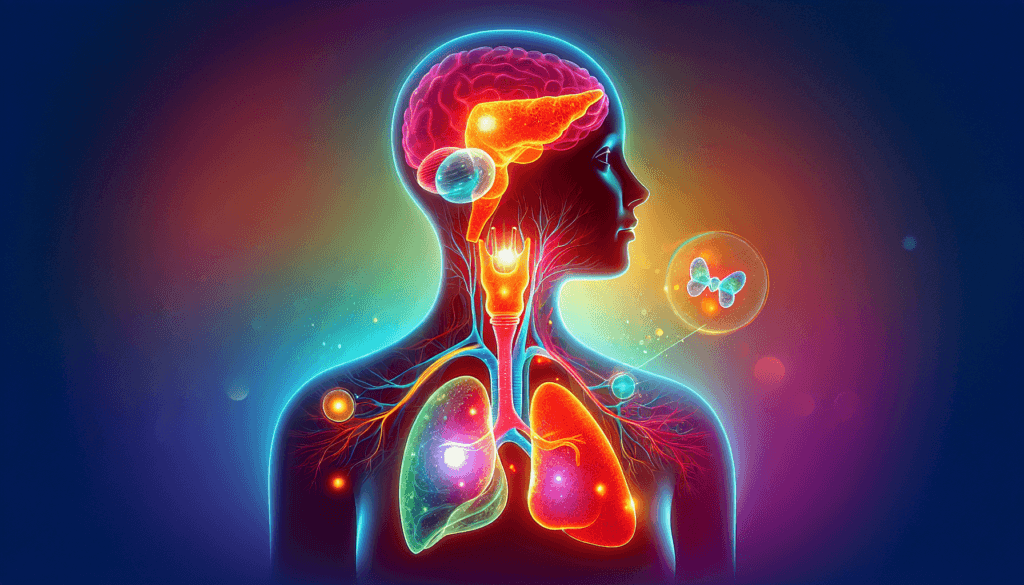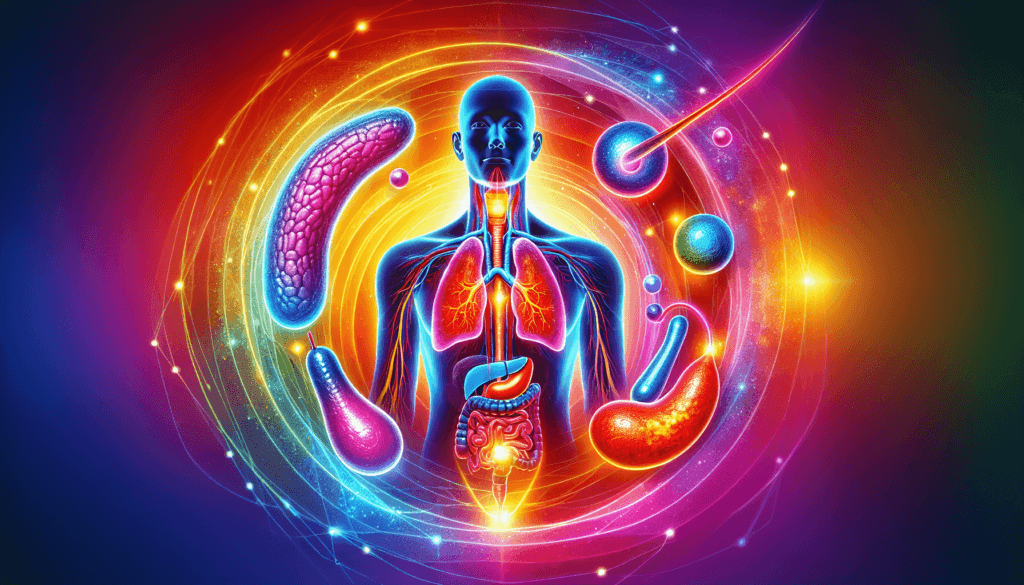Have you ever wondered why you feel full of energy one day and sluggish the next? Or perhaps you’ve noticed changes in your skin or mood and can’t pinpoint the cause? Chances are, hormones play a significant role in these everyday experiences. Hormones, those tiny chemical messengers circulating through your bloodstream, ensure your body’s various systems function harmoniously. They might be small, but their effects are mighty, regulating everything from growth and metabolism to mood and reproductive processes. Let’s take a closer look at the fascinating world of hormones and uncover why they hold such importance in our lives.
What Are Hormones?
Hormones are special chemical substances that act as messengers in your body. They are produced by glands in the endocrine system and travel through the bloodstream to target organs and tissues. Imagine hormones as little postal workers delivering messages that instruct certain parts of your body on what to do and when to do it.
How Do Hormones Work?
Table of Contents
Hormones operate via specific receptors on target cells, much like a key fits into a lock. Once a hormone binds to its receptor, it triggers specific responses in the cell, whether it’s initiating a growth spurt, adjusting your mood, or even affecting how you digest food. The effects might seem subtle, but their roles are crucial for maintaining your health and well-being.
The Core Functions of Hormones
Understanding hormones involves recognizing their core functions and the essential roles they play in everyday bodily processes. From helping you manage stress to ensuring you get adequate sleep, hormones are at the helm of your body’s smooth sailing.
Regulating Metabolism
Metabolism refers to the process by which your body converts what you eat and drink into energy. Hormones like insulin and glucagon are pivotal in balancing blood sugar levels, ensuring a steady supply of energy. Thyroid hormones also regulate metabolic rates, influencing how your body uses energy at rest and during activity.
Influencing Growth and Development
During childhood and adolescence, hormones work behind the scenes influencing growth spurts and the development of sex characteristics. Growth hormone and sex hormones like testosterone and estrogen ensure proper physical development during these formative years.
Controlling Reproductive Processes
From the onset of puberty to parenthood, hormones steer your reproductive systems. In women, hormones like estrogen and progesterone regulate the menstrual cycle and pregnancy. In men, testosterone is crucial for the production of sperm and the development of male characteristics.
Mood Regulation and Behavior
Ever notice how your feelings can suddenly shift? Hormones such as serotonin, dopamine, and cortisol are key players in mood regulation. They contribute to your emotional responses and can influence behaviors like sleep, appetite, and response to stress.

Exploring Major Hormones and Their Roles
With the basics laid out, let’s delve into some of the major hormones, exploring their specific roles and how they impact your daily life.
Insulin: The Blood Sugar Balancer
Produced by your pancreas, insulin is essential in regulating your blood sugar levels. After you eat, insulin is released to help cells absorb glucose for energy. Without proper insulin function, as seen in diabetes, blood sugar regulation becomes disrupted.
Cortisol: The Stress Manager
Known as the stress hormone, cortisol is released by your adrenal glands in response to stress and low blood sugar. It helps your body manage stress by increasing energy levels through glucose release. However, sustained high levels can lead to health issues, including weight gain and anxiety.
Thyroid Hormones: Metabolism Regulators
The thyroid gland produces hormones like thyroxine, influencing numerous functions, from heart rate to metabolism. If thyroid hormone levels are off-balance, you might experience fatigue, weight changes, or difficulty concentrating.
Estrogen and Progesterone: Female Reproductive Hormones
These hormones are paramount in regulating menstrual cycles, pregnancy, and other key functions in the female body. They also influence bone health, heart function, and mood, showcasing their wide-ranging impact.
Testosterone: The Male Reproductive Hormone
While predominantly seen as a male hormone, testosterone is also present in females. It’s crucial for muscle mass development, libido, and the production of red blood cells, among other roles.
Adrenaline: The Fight-or-Flight Hormone
Adrenaline, also known as epinephrine, kicks into action during emergency situations, prepping your body for a quick response. It increases heart rate, expands airways, and provides your muscles with a burst of energy.
The Interplay Between Hormones
An interesting aspect of hormones is how they interact with each other. The body’s complex hormonal network operates like a symphony where a fine-tuned balance is necessary for achieving harmony. A disruption in this balance, often referred to as hormonal imbalances, can lead to various health challenges.
What Happens With Hormonal Imbalance?
When hormone levels are too high or too low, it can lead to a range of symptoms and health concerns. For instance, an overproduction of thyroid hormones is known as hyperthyroidism, leading to increased metabolism and weight loss. Conversely, hypothyroidism signifies an underactive thyroid, causing fatigue and weight gain. Seeking medical advice for diagnosis and treatment is key to managing these imbalances.

The Benefits and Importance of Balanced Hormones
Balanced hormones are crucial for maintaining optimal health and ensuring that bodily processes run smoothly. They support growth, metabolism, sexual development, and mood stabilization. Therefore, achieving and sustaining hormonal balance is pivotal to enhancing your overall quality of life.
Enhancing Physical Health
Balanced hormones contribute significantly to your physical health. They enable efficient metabolism, support cardiovascular health, and help maintain muscle mass and bone density. Quite simply, they provide your body with the tools it needs to function effectively.
Supporting Mental Well-being
Your mood and mental health can be profoundly affected by your hormone levels. Properly balanced hormones minimize mood swings, reduce anxiety and depression symptoms, and encourage restful sleep. Feeling centered and calm often starts with hormonal health.
Reproductive Health
In terms of reproductive health, balanced hormones ensure regular menstrual cycles and support fertility. They also provide the foundation for a healthy pregnancy and postpartum period, underscoring their importance for anyone looking to start or grow a family.
Hormonal Health in Different Life Stages
Hormones are influential across various stages of life, from birth through old age. Let’s consider how hormonal changes manifest in significant life phases.
Childhood and Adolescence
During these formative years, growth hormones and sex hormones are at the forefront. They drive physical growth, puberty, and sexual maturation, setting the stage for adulthood.
Adulthood
In adulthood, hormones maintain metabolism, reproductive functions, and energy levels. For women, this stage may include pregnancy and menopause, marked by significant hormonal shifts.
Midlife and Beyond
As people age, hormonal levels fluctuate, potentially decreasing. For instance, lower estrogen levels post-menopause can affect bone density and heart health, while in men, reduced testosterone can lead to decreased vitality and strength. Understanding these changes can help manage and address age-related concerns.
Tips for Promoting Hormonal Balance
Although our bodies naturally regulate hormones, lifestyle factors can positively or negatively impact hormonal balance. Here are some practical tips to support your endocrine system.
Prioritize a Balanced Diet
Consume a varied diet rich in whole foods, including plenty of fruits, vegetables, lean proteins, and healthy fats. Nutrient-rich foods supply essential vitamins and minerals that aid hormonal health, such as omega-3 fatty acids and antioxidants.
Stay Active
Regular physical activity boosts mood-regulating hormones like endorphins while supporting metabolic health. Aim for a mix of cardiovascular exercises, strength training, and flexibility workouts for comprehensive benefits.
Get Enough Sleep
Quality sleep is imperative for hormone regulation, particularly for stress hormones like cortisol and hunger hormones such as leptin. Aim to achieve 7-9 hours of sleep per night, creating a restful environment to enhance sleep quality.
Manage Stress
Chronic stress can disrupt hormone balance, leading to elevated cortisol levels and other imbalances. Incorporate stress-relief practices like yoga, meditation, or hobbies you enjoy into your routine to maintain calmness and equilibrium.
Limit Exposure to Endocrine Disruptors
Household chemicals, plastics, and certain personal care products may contain compounds that interfere with hormone production. Minimize exposure by choosing natural products, avoiding plastics with BPA, and ventilating living spaces regularly.
When to Seek Professional Help
If you suspect that hormonal imbalances are affecting your health, it’s important to consult with a healthcare professional. Early detection and treatment are key to restoring hormone balance and alleviating symptoms. A tailored approach can include lifestyle changes, medication, or other interventions suited to your specific needs.
Conclusion
Understanding the significance of hormones and their intricate roles in your body opens up a new appreciation for these unseen champions. With their complex interplay ensuring life’s delicate balance, hormones keep you active, healthy, and emotionally steady. By focusing on maintaining hormonal health through balanced living and seeking help when needed, you can enjoy a greater sense of well-being throughout your life. cherishing the subtle yet powerful influence of hormones is a journey well worth embarking on.





